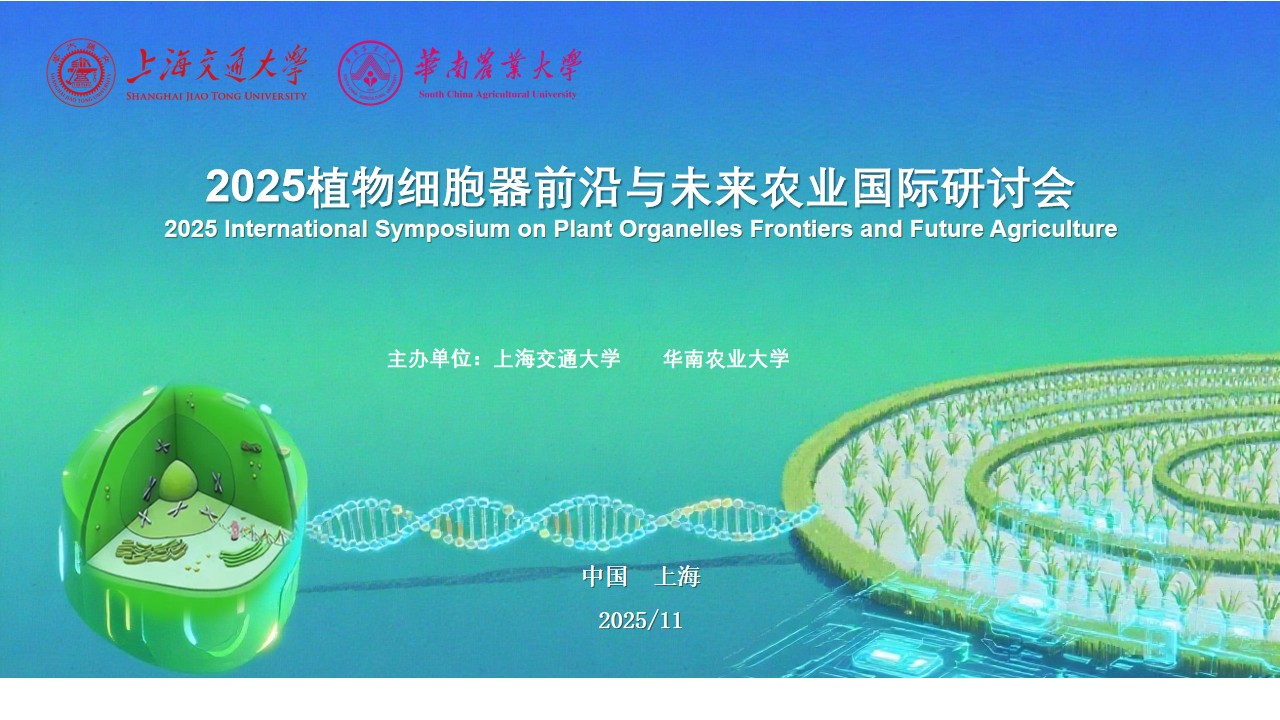2025 International Symposium on Plant Organelles Frontiers and Future Agriculture (Second Call)

Amidst pressing global challenges—population growth, climate change, and diminishing arable land—sustainable agriculture demands transformative scientific breakthroughs. Plant organelles, as fundamental units of cellular life, play a pivotal role in enhancing crop yields, improving stress tolerance, and optimizing resource efficiency. Rapid advances in gene editing, synthetic biology, and multi-omics technologies now offer unprecedented opportunities to revolutionize plant organelle research.
To foster international collaboration and bridge fundamental research with agricultural applications, Shanghai Jiao Tong University (SJTU) and South China Agricultural University (SCAU) will co-host the “2025 International Symposium on Plant Organelles: Frontiers and Future Agriculture” in Shanghai, mid-November 2025.
The symposium will gather distinguished scholars, outstanding young scientists, and leading journal editors worldwide to discuss the latest advances in plant organelle research and its transformative applications in future agriculture. We cordially invite your participation!
I. Conference Dates and Venue
Dates: November 13–16, 2025
Schedule:
November 13:
• Registration (All day)
• Early-Career Researchers Forum (Afternoon )
November 14–15:
• Plenary Sessions
November 16:
• Departure
Venue: Minhang Campus, Shanghai Jiao Tong University, Shanghai, China
II. Organizer
• Overseas Expertise Introduction Center for Plant Cell and Developmental Biology to Future Agriculture, SJTU
• Overseas Expertise Introduction Center for Subtropical Agro-Bioresources Development and Germplasm Innovation, SCAU
III. Local Host
• School of Agriculture and Biology, SJTU
• Shanghai Collaborative Innovation Center of Agri-Seeds
• Shanghai Future Agriculture Research Center
• College of Agriculture, SCAU
• College of Life Sciences, SCAU
• Molecular Horticulture
IV. Conference Theme
Deciphering Organelle Functions, Powering Sustainable Agriculture Innovation
V. Conference Speakers
11/13 | |
14:00-18:00 | Early-Career Researchers Forum |
11/14 | |
Opening Ceremony | |
Organelle Biogenesis and Biotechnology | |
Ralph Bock | Max Planck Institute of Molecular Plant Physiology, Germany |
Paul Jarvis | University of Oxford, UK |
Liwen Jiang | The Chinese University of Hong Kong, China |
Zhaosheng Kong | Shanxi Agricultural University, China |
Tea Break | |
Hakim Mireau | French National Research Institute for Agriculture, Food, and Environment |
Jiang Zhang | Agricultural Genomes Institute at Shenzhen, CAAS |
Journal Forum | Molecular Plant/Plant Communications(Xiaofeng Cui) |
Lunch | |
Intra and Inter Cellular Communication | |
Katayoon Dehesh | University of California, Riverside, USA |
Baocai Tan | Shandong University, China |
Ying Fu | China Agricultural University, China |
Guo-zhang Wu | Shanghai Jiao Tong University, China |
Teva Vernoux | French National Centre for Scientific Research (CNRS) |
Tea Break | |
Xuemei Chen | Peking University, China |
Jianming Li | Hong Kong Baptist University, China |
Chanhong Kim | CAS Centre for Excellent in Molecular Plant Sciences, China |
Hussam Nour-Eldin | University of Copenhagen, Denmark |
Journal Forum | Advanced Science(Lei Lei) |
Dinner | |
11/15 | |
Molecular Breeding and Organelle Genome Editing | |
Barry Pogson | Australian National University, Australia |
Lixin Zhang | Henan University, China |
Wenbin Zhou | Institute of Crop Science, CAAS |
Youshun Lin | Shanghai Jiao Tong University, China |
Tea Break | |
Ian Small | University of Western Australia |
Jin-Soo Kim | Korea Advanced Institute of Science and Technology,Korea |
Shin-ichi Arimura | University of Tokyo, Japan |
Yongyao Xie | South China Agricultural University (SCAU), China |
Journal Forum | Nature Communications(Congyao Xu) |
Lunch | |
Cross Displine Advances Power Organelle Research | |
Yu Zhang | CAS Centre for Excellent in Molecular Plant Sciences, China |
Zhenfeng Liu | Institute of Biophysics, Chinese Academy of Sciences, China |
Klaas van Wijk | Cornell University, USA |
Hao Wang | South China Agricultural University (SCAU), China |
Tea Break | |
Xiaofeng Fang | Tsinghua University, China |
Wei Wang | Peking University, China |
Pengwei Wang | Huazhong Agricultural University, China |
Monika Chodasiewicz | King Abdullah University of Science and Technology (KAUST), Saudi Arabia |
Ying Gu | Pennsylvania State University, USA |
Awarding, Close | |
Dinner | |
VI. Conference Registration
Registration Deadline: November 10, 2025
| Participant Type | Before Oct. 1, 2025 | After Oct. 1, 2025 |
| Researchers | RMB 1,500 (210 USD) | RMB 1,800 (250 USD) |
| Students | RMB 1,000 (140 USD) | RMB 1,300 (180 USD) |
- Registration is non-refundable, but attendees can be changed.
- For any questions, please contact: Ms Yang (yang.0529@sjtu.edu.cn / +86-17821330237)
Online Registration:
Registration Link:https://wj.sjtu.edu.cn/q/j7z5ZAYu
Payment Information:
- BANK NAME: BANK OF CHINA, SHANGHAIJIAOTONG UNIVERSITY SUB-BRANCH
- ACCOUNT NAME: SHANGHAI JIAOTONG UNIVERSITY
- BANK ADD: NO.800 DONG CHUAN ROAD, SHANGHAI, CHINA
- SWIFT CODE: BKCHCNBJ300
- ACCOUNT NUMBER: 439059226890
- TEL: 54747180 - POST CODE: 200240
Please specify “2025 Plant Organelle Symposium” in the memo and email the transfer receipt and participant information (name and institution) to yang.0529@sjtu.edu.cn for verification and invoice issuance.
VII. Youth Forum Report, Abstract and Poster Submission
1. Application for oral presentation on “Early-Career Researchers Forum”
- Doctoral students, postdoctoral researchers, and young faculty members (including PIs who have established their research groups within the last 5 years) may apply for the oral presentation on“Early-Career Researchers Forum”during registration.
2. Abstract Submission:
- The abstract is limited to ONE A4 page following the template provided
- Submission Deadline: October 25, 2025
- Submission: Please email the abstract to: chuandewang@sjtu.edu.cn

3. Poster Presentation:
- Size: 90 cm (W) × 120 cm (H), margins 25 mm for top and bottom
- Please send the poster file (PPT or PDF) to yang.0529@sjtu.edu.cn, the organizer will print the poster and arrange the exhibition.
VIII. Sponsors and Exhibitors
Companies are warmly invited to sponsor/affiliate with the conference through exhibits or oral presentations.
- Limited slots are available.
- For partnership inquiry, please contact: Chun Yang (yang.0529@sjtu.edu.cn / +86-17821330237)
IX. Accommodation Suggestions
1. Nearby Hotels:
School of Agricultural and Biology is close to the No.3 North gate of Minhang campus, SJTU (601 Jianchuan Rd.).
(1) Shanghai Platinum Hanjue Hotel, 1577 Humin Rd., Tel: 021-31858888
(2) Courtyard by Marriott, 588 Zixing Rd. Tel: 021-34029000
(3) Wujing Baolong Art Hotel, 39-1 Shangyi Rd. Tel: 021-33880888
(4) Huhua International Hotel, 368 Jianchuan Rd. Tel: 021-64508999
2. Transportation Tips:
(1) Pudong Airport → SJTU Minhang Campus:
Metro Line 2 ➜ Line 15 (2.5h, 9 Yuan)
Airport link line ➜ Line 15 (1h, 21 Yuan)
Taxi/Ride-hailing (DiDi, ~50 min, 150-200 Yuan)
(2) Hongqiao Airport/Station → SJTU Minhang Campus
Metro Line 2 ➜ Line 15 (1.5h, 6 Yuan)
Airport link line ➜ Line 15 (1h, 13 Yuan)
Taxi/Ride-hailing (DiDi, ~40 min, 80-100 Yuan)